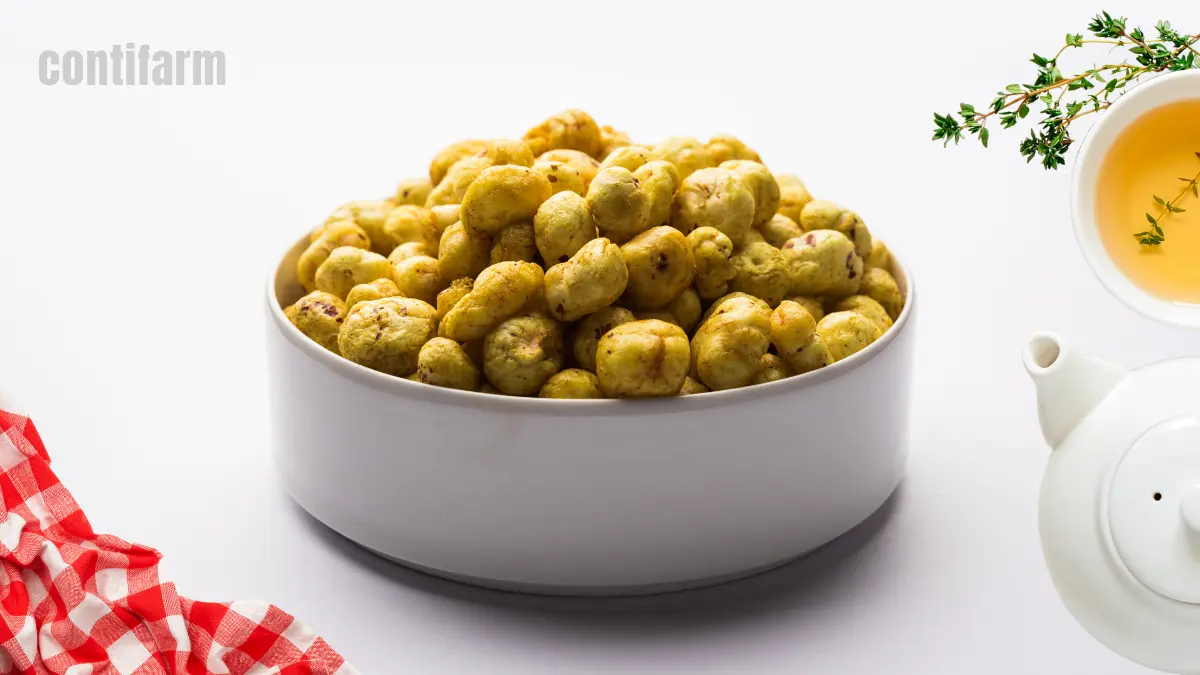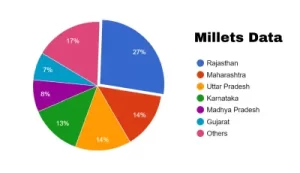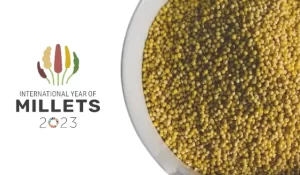Makhana, also known as fox nuts, is a nutrient-rich seed that is harvested from the lotus flower. With a crunchy texture and mild flavour, it’s a popular ingredient in various cuisines, especially in South Asian and East Asian dishes.
More than its flavour, makhana is valued for its high protein content, low-calorie, and numerous health benefits, making it a nutritious addition to our food. Let’s learn more about this gluten-free vegan superfood.

Table of Contents
Makhana in Different Languages
Ever wondered what makhana is called in your language? Explore its native name below! If you have another term in your culture, share it with us in the comments!
| LANGUAGE | POPULAR NAMES |
|---|---|
| English | Fox nut, Gorgon nut, Prickly water lily seeds |
| French | Graines de lotus, Noix de lotus |
| German | Fuchsnüsse, Lotussamen, Euryale ferox |
| Spanish | Semillas de loto, Nuez de loto |
| Arabic | Buthoor al Lotus (بذور اللوتس) |
| Hebrew | אגוז פוקס |
| Japanese | Hasu no Tane (蓮の種), Gifumi (ギフミ) |
| South Korean | Yeonsuk (연숙) |
| Mandarin Chinese | Liánzi (莲子) |
| Hindi | Makhana (मखाना), Phool Makhana |
| Indian Vernacular | Tavare beeja (ತಾವರೆ ಬೀಜ), Thamarai vithai (தாமரை விதை), Kamal kakri (કમલ કકડી) |
How Nutritious is Makhana?
Makhana is a nutritious snack option that provides protein, healthy fats, fibre, vitamins, minerals, and antioxidants, making it a healthy addition to your diet. Below table lists the macronutrients and their value per serving (30 grams) of makhana.
Macronutrients of Makhana
| MACRONUTRIENTS | VALUE / 30g | KEY BENEFITS |
|---|---|---|
| Calories | 100 – 120 cal | Low in calories. |
| Protein | 3g – 4g | Good source of plant-based protein. |
| Carbohydrates | 20g – 25g | Contains carbs primarily in the form of starch. |
| Fiber | 2g – 3g | Rich in dietary fibre; beneficial for digestive health. |
| Fat | 1g – 2g | Rich in healthy fats; omega-3 and omega-6 fatty acids. |
Makhana is also a rich source of essential micronutrients like vitamins and minerals. Some of these micronutrients are listed below for your ready reference.
Micronutrients of Makhana
| Vitamin E | It is beneficial for skin health and overall well-being. |
| Vitamin B | Makhana provides B vitamins such as thiamine (B1), riboflavin (B2), niacin (B3), and folate (B9), which are important for energy production and metabolism. |
| Magnesium | Important for muscle function, nerve function, and bone health. |
| Phosphorus | Essential for bone health and energy metabolism. |
| Potassium | Important for maintaining electrolyte balance and heart health. |
| Iron | Important for red blood cell production and oxygen transport in the body. |
| Zinc | Important for immune function, wound healing, and DNA synthesis. |
| Antioxidants | Makhana contains antioxidants like flavonoids, which help fight oxidative stress and reduce the risk of chronic diseases. |
What Are The Health Benefits of Makhana?
Amidst all the current excitement, you might naturally wonder, what are the benefits of eating makhana? Or, may be curious, how can makhana even help in weight management, skin health, or overall wellness?
Well, no need to wonder! We are here to share all the major health benefits of makhana. Let’s uncover some fascinating insights into how it may help us stay healthy.
(1) Helps in Weight Management
Makhana is a low-calorie snack that keeps you feeling full for longer, helping to prevent overeating. Its satisfying crunch makes it a guilt-free choice, ideal for healthy snacking, especially for those aiming to lose weight.
(2) Improves Digestive Health
Makhana contains plenty of dietary fibre, which enhances regular bowel movements. This fibre adds volume to your stool, facilitating smoother passage through the digestive system and reducing the likelihood of constipation. Moreover, it promotes a balanced gut microbiome, contributing to overall digestive well-being.
(3) Promotes Heart Health
Makhana is cholesterol-free and contains negligible amounts of saturated fats, making it heart-friendly. These seeds are a good source of potassium, an essential mineral that plays a crucial role in maintaining heart health. Potassium helps regulate blood pressure and supports proper heart rhythm.
(4) Assists in Diabetes Management
Makhana has a low glycemic index, meaning it does not cause a rapid spike in blood sugar levels. This makes it a suitable snack option for individuals with diabetes or those aiming to manage blood sugar levels. The presence of complex carbohydrates and fibre in makhana helps stabilize blood glucose levels. It prevents sudden fluctuations in insulin production, contributing to better diabetes management.
(5) Good for Bone Health
Makhana is rich in calcium and phosphorus, essential minerals for maintaining strong and healthy bones. Regular consumption can contribute to improved bone density and reduce the risk of osteoporosis.
(6) Helps Combat Inflammation
Makhana is a good source of antioxidants, such as flavonoids and phenolic compounds. These antioxidants help combat oxidative stress in the body, reducing inflammation and lowering the risk of chronic diseases.
(7) Gluten-Free (Allergy friendly)
Makhana is naturally gluten-free, making it a safe and nutritious snack option for individuals with gluten intolerance or celiac disease. It is also relatively low in allergens, making it suitable for those with food sensitivities.
Incorporating makhana into your diet can offer these health benefits while providing a delicious and versatile snack option.
Is Makhana Expensive?
You might have often heard people wondering, why is makhana so expensive? The real question is, are they even aware of the health benefits that makhana has to offer?
Let’s clear out the misconceptions relating to the affordability of makhana by learning about the crop.
Makhana is a perennial aquatic crop, meaning it’s a plant that continues to grow and produce seeds from the same root system year after year. However, this process involves multiple growth cycles before the plant actually bears fruit. The longer growth cycle and labour-intensive cultivation contribute to its overall cost.
When we evaluate makhana’s cost relative to its health benefits, they come out to be a cost-effective choice compared to the remedies we opt for when health is deteriorated. Remember, precaution is better than cure.
While we learnt how the benefits of makhana outweighs its cost, the question still remains, what is the price of makhana?
What is The Price of Makhana?
Like every other commodity, makhana prices are fluctuating. Prices generally range from affordable to premium, varying across seasons, qualities, and market conditions.
During the harvest season, typically between August and October, Makhana prices tend to be more economical due to increased supply. In contrast, during the off-season, especially in winter months, prices may escalate due to limited availability.
Market dynamics are useful for wholesale businesses; but for retail buyers, seasons don’t matter much, as the quantity is insignificant. In retail, it’s all about availability, convenience, and experience. Several companies offer roasted and flavoured options in their brands.
In retail market, 65g to 70g pack of flavoured makhana sells at Rs. 100 to 135. It may vary depending upon season, quality, brand, and other market forces.
Makhana in Your Everyday Food
While we learnt about the nutritional values and health benefits of makhana, let’s celebrate this wholesome food by adding it to our everyday dishes.
Traditionally, makhana is consumed as a snack. However, it seamlessly integrates into everyday meals.
Whether consumed raw, roasted, or ground for diverse culinary applications, makhana adds a delightful touch to both sweet and savory dishes. For those seeking inspiration, here are some popular makhana dishes to embark on your flavourful cooking adventure.
Makhana Recipes
- Makhana Chaat
- Makhana Curries
- Makhana Kheer
- Makhana Porridge
- Makhana Raita
- Makhana Roasted Snacks
- Makhana Salads
- Makhana Stir-Fries
- Makhana Trail Mix




